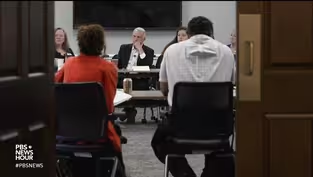
Fragments of bird flu virus detected in cow's milk
Clip: 4/24/2024 | 5m 44sVideo has Closed Captions
Fragments of bird flu virus detected in cow's milk sold in grocery stores
The FDA says samples of milk taken from grocery stores have tested positive for remnants of the bird flu virus that has infected dairy cows. But the agency says it's confident the milk in stores is safe. It suggests the virus is spreading more prevalently among dairy herds than previously thought. Geoff Bennett discussed more with Dr. Jennifer Nuzzo of the Pandemic Center at Brown University.
Problems playing video? | Closed Captioning Feedback
Problems playing video? | Closed Captioning Feedback
Major corporate funding for the PBS News Hour is provided by BDO, BNSF, Consumer Cellular, American Cruise Lines, and Raymond James. Funding for the PBS NewsHour Weekend is provided by...

Fragments of bird flu virus detected in cow's milk
Clip: 4/24/2024 | 5m 44sVideo has Closed Captions
The FDA says samples of milk taken from grocery stores have tested positive for remnants of the bird flu virus that has infected dairy cows. But the agency says it's confident the milk in stores is safe. It suggests the virus is spreading more prevalently among dairy herds than previously thought. Geoff Bennett discussed more with Dr. Jennifer Nuzzo of the Pandemic Center at Brown University.
Problems playing video? | Closed Captioning Feedback
How to Watch PBS News Hour
PBS News Hour is available to stream on pbs.org and the free PBS App, available on iPhone, Apple TV, Android TV, Android smartphones, Amazon Fire TV, Amazon Fire Tablet, Roku, Samsung Smart TV, and Vizio.
Providing Support for PBS.org
Learn Moreabout PBS online sponsorshipGEOFF BENNETT: The U.S. FDA says that samples of milk taken from grocery stores across the U.S. have tested positive for remnants of the bird flu virus that has infected dairy cows.
But the agency says it's confident the milk you are buying is safe.
Officials also say the finding suggests the virus is spreading more prevalently among dairy herds than previously thought.
To help slow that spread, the USDA announced today that dairy cattle must now be tested for the virus before moving to a new state.
We're joined now by Dr. Jennifer Nuzzo, a director of the Pandemic Center at Brown University.
Thank you for being with us.
So let's start with the latest update, particles of this virus found in commercial pasteurized milk.
How concerned should the everyday consumer be?
DR. JENNIFER NUZZO, Brown University School of Public Health: I don't have any reason to be concerned at this point.
Finding evidence of genetic material, which is what the test results told us, by itself is not alarming.
In order to know if the virus will infect us, we have to do a different kind of test.
And this test was not that.
They're actually undergoing those tests now.
But I don't have any reason to think that we will be harmed, because we use pasteurization.
And I have no reason to think that the H5N1 virus is any different from all the other pathogens that we think could be in milk.
Pasteurization doesn't remove the genetic material of those pathogens, but it changes the pathogens and either kills or it activates them, so that they can't infect us.
And I fully expect that that's what the test results will say, and just more reason to choose pasteurized milk over raw milk.
GEOFF BENNETT: And yet we know that this virus is more prevalent in dairy cows than previously thought.
How worrying is that, just the prevalence alone?
DR. JENNIFER NUZZO: Yes, so I am quite worried about that.
But I'm not worried about that because I think it means something for a threat to the general public.
I'm worried about it because it's an indication that we're not doing good enough surveillance to try to keep track of this virus, to stay ahead of it, and, most importantly, we're not doing enough surveillance to protect the farmworkers, who we know are likely being exposed to this virus.
So where I am worried right now is specifically for the farmworkers.
We have already had the report of one farmworker who was infected.
Fortunately, it was a mild infection.
But, historically, people who have been infected with this virus have not experienced mild symptoms.
So I am most worried about protecting farmworkers who we think are likely having exposure to this virus, especially now that we are finding out that it may be in far more places than we previously thought.
GEOFF BENNETT: Well, when it comes to the USDA doing more effective surveillance and communication, what does that work actually look like?
DR. JENNIFER NUZZO: It means doing more testing.
And testing of dairy cows up until this point, and even now, is actually voluntary.
And USDA recommends only testing cows with symptoms.
We know that that's likely not to be sufficient to detect the virus in all places that it is.
First of all, you can only find it if you choose to do the test.
And, also, we know that, in North Carolina, when they tested cows without symptoms, they in fact found the virus.
So if we're only doing voluntary testing and if we're only testing symptomatic cows, then, by definition, we're probably not going to find the virus until after farmworkers have been exposed.
Now, there was important development today, where the USDA said it would require testing of cows before they move between states.
And that's potentially an important development, particularly if we think the movement of cows is what's spreading this virus.
Unfortunately, we actually don't have a lot of data that tells us what is spreading this virus.
So it's hard for me to judge how much of an impact this policy will have.
I do think more testing is better than less testing.
So I'm happy to see this, but I really wish we had more data that would give me more confidence that we are tracking this virus to stay ahead of it, but, most importantly, to make sure that we're protecting workers who may be exposed to it.
GEOFF BENNETT: And how prepared is the U.S. for the possibility of a still-remote -- we should emphasize and underscore that -- bird flu pandemic?
DR. JENNIFER NUZZO: Absolutely.
Thank you for underscoring that.
Yes, today I am not worried that we are in a pandemic, by any means, but we should very much pay attention to this virus.
We have actually been tracking this virus for more than 20 years.
Some of these latest developments do increase my worry a bit.
In terms of how prepared we'd be to respond, I mean, obviously, we look back on what happened with the COVID-19 pandemic, and we saw many challenges.
Some of those challenges have been addressed, but some of them still haven't.
Influenza is an easier case.
When we started the COVID-19 pandemic, we had no idea whether we would have vaccines within a year.
We already know that we can make H5N1 vaccines, so that puts us at an advantage, but there will still be challenges.
It will take time to make enough vaccine for everyone.
There will be challenges about what we do in the meantime.
Influenza viruses typically affect the very young and the very old, so we have more high-risk groups than we probably had with COVID-19, so there are still some challenges, to be sure.
The reason why we are tracking this virus is so that we can get a signal of its potential threat, so that we can act very, very quickly to prevent the kind of harms that we saw in the early days of the COVID-19 pandemic, so that we don't have a repeat of that.
GEOFF BENNETT: Dr. Jennifer Nuzzo, a director of the Pandemic Center at Brown University, thanks so much for your time and for your insights.
DR. JENNIFER NUZZO: Thanks for having me.
Father's fight for change persists 25 years after Columbine
Video has Closed Captions
Clip: 4/24/2024 | 6m 9s | Father's push to end gun violence persists 25 years after his son was killed at Columbine (6m 9s)
How a North Carolina community is confronting divisions
Video has Closed Captions
Clip: 4/24/2024 | 11m 19s | How a North Carolina community is confronting divisions, talking through its differences (11m 19s)
How the $95 billion foreign aid package will be spent
Video has Closed Captions
Clip: 4/24/2024 | 5m 25s | A look at what's in the $95 billion foreign aid package and what the money does (5m 25s)
Supreme Court weighs federal law on emergency abortions
Video has Closed Captions
Clip: 4/24/2024 | 6m 30s | Supreme Court weighs whether federal law allowing emergency abortions overrides state bans (6m 30s)
Ukrainian pastors show resilience while facing persecution
Video has Closed Captions
Clip: 4/24/2024 | 9m 22s | Ukrainian evangelical pastors show resilience while facing persecution from Russian forces (9m 22s)
Providing Support for PBS.org
Learn Moreabout PBS online sponsorship
- News and Public Affairs

FRONTLINE is investigative journalism that questions, explains and changes our world.

- News and Public Affairs

Amanpour and Company features conversations with leaders and decision makers.












Support for PBS provided by:
Major corporate funding for the PBS News Hour is provided by BDO, BNSF, Consumer Cellular, American Cruise Lines, and Raymond James. Funding for the PBS NewsHour Weekend is provided by...




